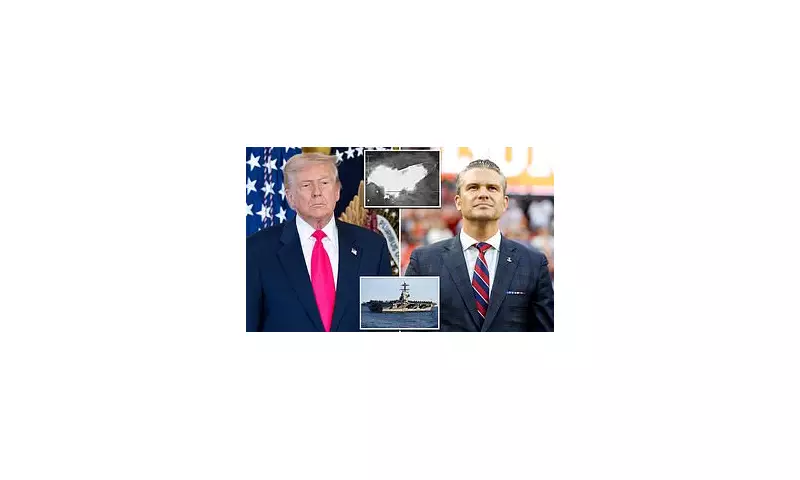
The United States military has eliminated three suspected narco-terrorists in its latest Caribbean operation, marking the 21st such strike in the region as part of Operation Southern Spear. This brings the total number of individuals killed in these efforts to 83.
Major Military Buildup in Caribbean Waters
The Pentagon continues to significantly increase its military footprint in the Caribbean, underscored by the arrival of the nation's most advanced aircraft carrier, USS Gerald R Ford, on Sunday. This deployment represents the largest buildup of American firepower in the region in generations.
According to US Southern Command, Saturday's strike targeted a vessel involved in illicit narcotics smuggling along a known trafficking route. The operation occurred in international waters after intelligence confirmed the boat was carrying narcotics through the Eastern Pacific.
The arrival of the Ford carrier strike group, which includes numerous fighter jet squadrons and guided-missile destroyers, adds substantial weight to an already considerable American naval presence. The Navy confirmed the group transited the Anegada Passage near the British Virgin Islands on Sunday morning.
Operation Southern Spear Expands
With the addition of the USS Gerald R Ford, Operation Southern Spear now encompasses nearly a dozen Navy ships and approximately 12,000 sailors and Marines. This substantial force has raised questions about the Trump administration's broader intentions in South America beyond its stated counterdrug objectives.
Rear Admiral Paul Lanzilotta, commanding the strike group, stated the deployment will strengthen existing American warship presence to "protect our nation's security and prosperity against narco-terrorism in the Western Hemisphere."
Admiral Alvin Holsey, overseeing Caribbean and Latin American operations, emphasised that American forces "stand ready to combat the transnational threats that seek to destabilize our region." Holsey, who will retire next month after just one year in the position, described the strike group's deployment as "a critical step in reinforcing our resolve to protect the security of the Western Hemisphere."
Regional Reactions and Training Exercises
The military moves have generated mixed responses across the region. In Trinidad and Tobago, located merely seven miles from Venezuela at its closest point, government officials confirmed troops have begun training exercises with US military personnel that will continue through much of the week.
Minister of Foreign Affairs Sean Sobers characterised these joint exercises as the second in less than a month, aimed at addressing violent crime in the island nation that has become a transit point for drug shipments destined for Europe and North America. The Trinidadian prime minister has emerged as a vocal supporter of US military strikes.
These exercises will involve Marines from the 22nd Expeditionary Unit who have been stationed aboard Navy ships positioned off Venezuela's coast for several months.
Conversely, Venezuela's government has condemned the training exercises as acts of aggression. President Nicolás Maduro, who faces US narcoterrorism charges, maintains that the American government is "fabricating" a war against him. On his Facebook page, Maduro declared on Sunday that the "Venezuelan people are ready to defend their homeland against any criminal aggression."
Meanwhile, Army Secretary Dan Driscoll revealed on Sunday that US troops have been conducting training in Panama, highlighting the administration's growing focus on Latin America. "We're reactivating our jungle school in Panama. We would be ready to act on whatever" Trump and Defense Secretary Pete Hegseth required, he told CBS's 'Face the Nation'.
Political Context and Legal Challenges
The Trump administration maintains that the military buildup focuses exclusively on stopping drug flows into the United States, though it has provided no evidence supporting its characterisation of those killed as 'narcoterrorists.'
President Trump has justified attacks on drug vessels by asserting the US is in "armed conflict" with drug cartels while claiming these boats operate under foreign terrorist organisations. He has indicated military operations will expand beyond maritime strikes, vowing to "stop the drugs coming in by land."
Secretary of State Marco Rubio has intensified diplomatic pressure, calling Venezuela's government a "transshipment organization" that openly cooperates with drug traffickers. The State Department announced plans to designate Cartel de los Soles, allegedly headed by Maduro and senior government officials, as a foreign terrorist organisation effective November 24th.
While the administration insists its Caribbean presence constitutes counterdrug operations, many observers interpret the moves as escalating pressure tactics against Maduro's government. The USS Gerald R Ford's capabilities, though considered ill-suited for cartel engagements by some experts, serve as potent intimidation instruments in efforts to compel Maduro's departure.
The military escalation has faced criticism from regional leaders, UN human rights officials, and US lawmakers including Republicans seeking more information about targeting procedures and legal justifications for boat strikes. However, Senate Republicans recently rejected legislation that would have constrained Trump's authority to launch attacks against Venezuela without congressional approval.





